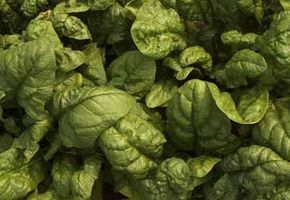On September 14, 2006, the United States Food and Drug Administration (FDA) issued a warning about the safety of raw, bagged spinach. The Centers for Disease Control (CDC) informed the FDA that it had linked the spinach to several illnesses. More than 100 people had gotten sick, and one had died.
Most people associate foodborne illnesses with meat, chicken, seafood and eggs -- not with salad, spinach and other vegetables. In fact, E. coli O157:H7, the strain of bacteria that likely infected the spinach, is most commonly found in ground beef. In 1993, for example, 700 people became infected with E. coli after eating undercooked fast-food hamburgers.
Advertisement
E. coli infects meat more often than vegetables because it lives in the intestines of mammals, including cows. It's relatively easy for E. coli to infect beef during processing, especially if the contents of a cow's intestines come into contact with meat, cutting utensils or surfaces.

So how do mammals' intestinal bacteria get into spinach? There are several possibilities, all of which involve cross-contamination -- the movement of bacteria from a contaminated surface to an uncontaminated one. Possible sources for E. coli contamination include:
- People: When people are infected with E. coli O157:H7, they shed the bacteria in their waste. If an infected person picks spinach without washing his hands after using the restroom, bacteria can move from his hands to the spinach.
- Animals: Animals can defecate in a field where the spinach is growing. Or, they can track waste from other areas into the field.
- Runoff: Heavy rains can sweep fecal matter from farms where animals live to fields where spinach grows.
- Food-processing equipment: Contaminated surfaces or machines in a food-processing plant can spread bacteria to lots of food very quickly.
These possibilities exist for any fruit or vegetable, not just spinach. In the past few years, E. coli outbreaks have also been traced to bagged salads, sprouts, cantaloupe and apple cider. Considering the large amounts of each of these foods sold and eaten every day, the overall risk is relatively low. However, when outbreaks do occur, they can be deadly. The bacteria causes severe cramps and bloody diarrhea. But in young children and elderly people, it can also cause hemolytic uremic syndrome, a potentially deadly kidney infection.
Fortunately, it's relatively easy to protect yourself from E. coli and other foodborne pathogens:
- When you hear a warning about food you've bought, throw the food away. Don't try to salvage it.
- Always wash your hands before preparing food and before eating. Otherwise, bacteria from your hands can contaminate your food.
- Wash fruits and vegetables before you eat them, even if their labels say they've already been washed. For foods with very bumpy skin, like cantaloupe, use a brush to scrub the surface.
- Keep foods that require cooking, like raw hamburger, away from foods that are ready to eat, like spinach.
- Refrigerate perishable foods promptly -- bacteria multiply quickly as foods approach room temperature.
- Cook meat thoroughly to kill any bacteria that may be inside.
Check out the links on the next page for more information on food, food safety and related topics.
Advertisement
